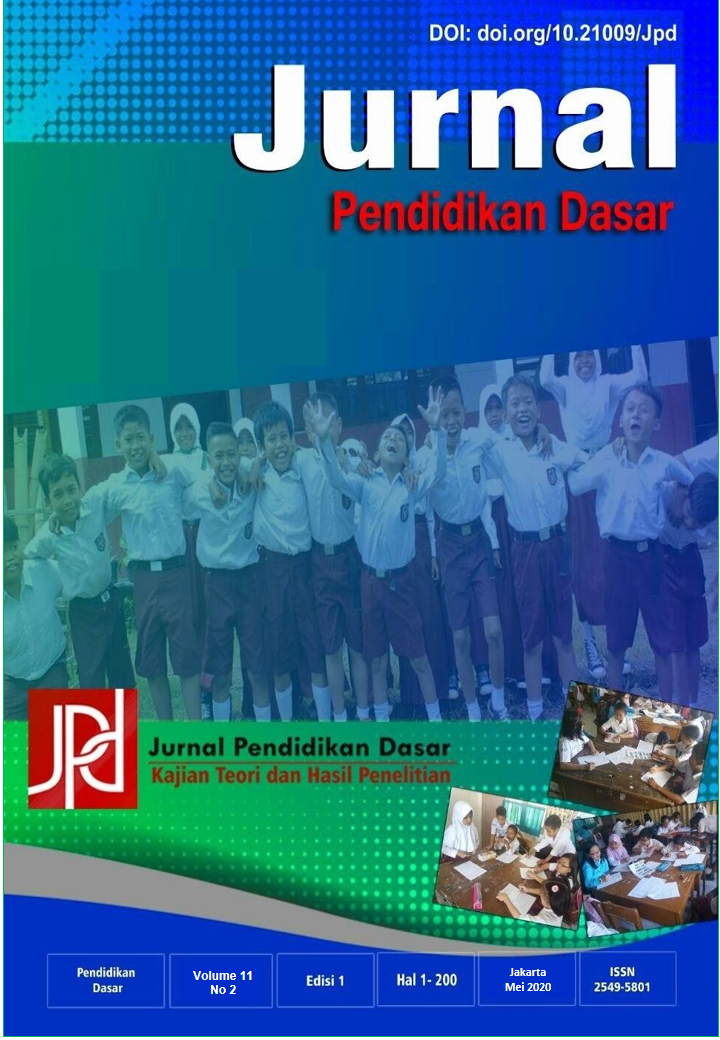EFEKTIFITAS MODUL BERBASIS LITERASI LINGKUNGAN MELALUI PENDEKATAN SAINTIFIK
DOI:
https://doi.org/10.21009/jpd.v11i02.18667Keywords:
modules, environmental literacy, scientific approachAbstract
Abstract: This research is based on the decreasing awareness of love for the environment of the nation's future generations. It is necessary to internalize methods or approaches in building awareness in fostering a sense of responsibility to nature and the environment. The environment is a place for living things to live in. Meeting the needs of life has a negative impact on the natural environment. Attention to environmental sustainability must be increased from various aspects, one of which is in the field of education to guide students in fostering a generation of environmental literacy using a scientific approach. Students are invited to observe, ask questions, collect information, reason, and then communicate the results that have been compiled from reading, seeing facts, and various information obtained from various ways and sources. This can be trained through student teacher candidates for primary school education to be applied in carrying out their professional duties as a teacher. This study aims to determine the effectiveness of the use of environmental literacy-based modules through a scientific approach in the low-grade science basic concepts course. The subjects of this study were students of Esa Unggul University Elementary School Teacher Education Jakarta. The research method uses development research using the Dick and Carey model. Effectiveness is measured based on the learning outcomes obtained from the pretest and posttest. The results showed that the effectiveness of using environmental literacy-based modules through a scientific approach, with an average increase of 28%. A scientific approach based on environmental literacy can be used in learning low-grade Science Concepts
Keyword: modules, environmental literacy, scientific approach
References
Damayanti, I. (2017). Pengembangan Modul Berorientasi Pendekatan Saintifik Pada Mata Pelajaran IPA Materi Pokok Sistem Peredaran Darah Siswa Kelas XI MA Syech Yusuf. UIN Alaudin Makassar, Makassar.
Höweler, E., & Meejin Yoon, J. (2015). Architectures of Eco-Literacy. In Ground Rules in Humanitarian Design (pp. 136–141). https://doi.org/10.1002/9781119148784.ch9
Ishak, M., Dyah Jekti, D. S., & Sridana, N. (2017). PENGARUH PENERAPAN PENDEKATAN SAINTIFIK MENGGUNAKAN MODEL PEMBELAJARAN DISCOVERY DAN KOOPERATIF TIPE STAD TERHADAP KEMAMPUAN BERPIKIR KREATIF PESERTA DIDIK SDN 13 AMPENAN. JURNAL PIJAR MIPA, 12(1). https://doi.org/10.29303/jpm.v12i1.326
JE, P. C., Sultan, M. T., Selvan, C. P., Irulappasamy, S., Mustapha, F., Basri, A. A., … Nichele, S. (2019). Research Methodology A Practical and Scientific Approach. Transportation Research Part F: Traffic Psychology and Behaviour.
Khoirudin, M. (2019). Pengembangan Modul Pembelajaran IPA Biologi Berbasis Scientific Approach Terintegrasi Nilai Keislaman Pada Materi Interaksi Antar Makhluk Hidup Dengan Lingkungan. IJIS Edu : Indonesian Journal of Integrated Science Education, 1(1), 33–42. Retrieved from http://ejournal.iainbengkulu.ac.id/index.php/ijisedu
Kurniasari, R. (2018). PENINGKATAN ECOLITERACY SISWA TERHADAP SAMPAH ORGANIK DAN ANORGANIK MELALUI GROUP INVESTIGATION PADA PEMBELAJARAN IPS. EduHumaniora | Jurnal Pendidikan Dasar Kampus Cibiru. https://doi.org/10.17509/eh.v10i2.10869
Locke, S., Russo, R., & Montoya, C. (2013). Environmental education and eco-literacy as tools of education for sustainable development. Journal of Sustainability Education, 4(January), 10. Retrieved from http://search.ebscohost.com/login.aspx?direct=true&AuthType=ip,url,cookie,uid&db=eue&AN=86430930&site=ehost-live&scope=site
Mustami, M. K., & Irwansyah, M. (2015). PENGEMBANGAN LEMBAR KERJA PESERTA DIDIK (LKPD) BERORIENTASI PENDEKATAN SAINTIFIK PADA MATA PELAJARAN BIOLOGI DI SMA. Lentera Pendidikan : Jurnal Ilmu Tarbiyah Dan Keguruan. https://doi.org/10.24252/lp.2015v18n2a8
Nasution, R. (2016). Analisis Kemampuan Literasi Lingkungan Siswa SMA Kelas X di Samboja dalam Pembelajaran Biologi. Proceeding Biology Education Conference.
Razak, M., Hala, Y., & Taiyeb, A. M. (2016). Efektifitas Pendekatan Saintifik Terhadap Keterampilan Proses Sains dan Hasil Belajar Kognitif Biologi Peserta Didik Kelas XII IPA SMA Negeri 4 Watampone. Jurnal Sainsmat, V(1), 58–73.
Riyanto. (2015). PENGEMBANGAN MODUL INTERAKTIF PADA PEMBELAJARAN GENETIKA UNTUK MENINGKATKAN HASIL BELAJARDAN PEMAHAMAN KONSEP SISWA SMA ISLAM BATU. Jurnal Edukasi Matematika Dan Sains, 3(2), 25–34. Retrieved from http://e-journal.unipma.ac.id/index.php/JEMS/article/view/174/148
Setiyadi, M. W. (2017). Pengembangan Modul Pembelajaran Biologi Berbasis Pendekatan Saintifik Untuk Meningkatkan Hasil Belajar Siswa. Journal of Educational Science and Technology (EST), 3(2), 102. https://doi.org/10.26858/est.v3i2.3468
Singleton, J. (2015). Environmental literacy and sustainabilit values : A content analysis of environmental education standards. Eco-Thinking, 1(1).
Sony Sukmawan, & M. Andhy Nurmansyah. (2012). Etika Lingkungan dalam Folklor Masyarakat Desa Tengger. Literasi, 2(1), 88–95.
Sufairoh. (2017). Pendekatan Saintifik & Model Pembelajaran K-13. Bahastra, 37(1), 89. https://doi.org/10.26555/bahastra.v37i1.5641
Sugiyono. (2016). Metode Penelitian dan Pengembangan (Research and Development/R&D). Bandung: Alfabeta.
Sumiati. A. (2008). Metode Pembelajaran. Bandung: Wacana Prima.
Suparman, A. (2014). Desain Instruksional Modern (Edisi Keem). Jakarta: Erlangga.
Susilana, R. (2017). PENDEKATAN SAINTIFIK DALAM IMPLEMENTASI KURIKULUM 2013 BERDASARKAN KAJIAN TEORI PSIKOLOGI BELAJAR. EDUTECH, 13(2), 183. https://doi.org/10.17509/edutech.v13i2.3095
Syofyan. Harlinda; Susanto Ratnawati; Vebryanti; Ramadhanti, Dita; Dwiyanti,Karina;Oktavia,Heni; Nur Atiffah, A. (2019). Literasi Penyuluhan Pengelolaan Sampah Untuk Siswa SDS Hati Kudus Jakarta. Jurnal Abdimas, 5(3), 217–221.
Syofyan, H. A. T. L. A. M. E. (2020). Application of Value Approaches in Science Learning for Elementary School Teacher Education Students. International Journal of Advanced Science and Technology, 25(5), 8978–8981. Retrieved from http://sersc.org/journals/index.php/IJAST/article/view/18743
Syofyan, H., Zulela, & Sumantri, M. (2019). Pengembangan Awal Bahan Ajar IPA Di Sekolah Dasar. JPD: Jurnal Pendidikan Dasar P-ISSN.
Syofyan, Harlinda, & Amir, T. L. (2019). Penerapan Literasi Sains dalam Pembelajaran IPA untuk Calon Guru SD. Journal Pendidikan Dasar.
Syofyan, Harlinda, & Rachmadtullah, R. (2019a). Increasing ecoliteracy on the impact of organic waste management using a problem a problem-solving the model. International Journal of Scientific and Technology Research.
Syofyan, Harlinda, & Rachmadtullah, R. (2019b). Increasing Ecoliteracy on the Impact of Organic Waste Management Using a Problem a Problem-solving the Model. International Journal of Scientific and Technology Research.
UTAMI, I. B. (2015). IMPLEMENTASI PENDEKATAN SAINTIFIK DALAM KURIKULUM 2013 PADA SISWA KELAS II SDN PREMBULAN, KULON PROGO. Journal of applied microbiology.
Widowati, A. (2011). Membentuk Generasi Berliterasi Lingkungan dengan Penerapan Pendekatan STM dalam Pembelajaran Sains. Seminar Nasional Pendidikan IPA, 407–414. Retrieved from http://staffnew.uny.ac.id/upload/132319972/penelitian/Membentuk Generasi Berliterasi Lingkungan dengan Penerapan Pendekatan STM dalam Pembelajaran Sains.pdf
Zaim, M. (2017). Implementing Scientific Approach to Teach English at Senior High School in Indonesia. Asian Social Science. https://doi.org/10.5539/ass.v13n2p33
Downloads
Published
How to Cite
Issue
Section
License
Jurnal Pendidikan Dasar





















